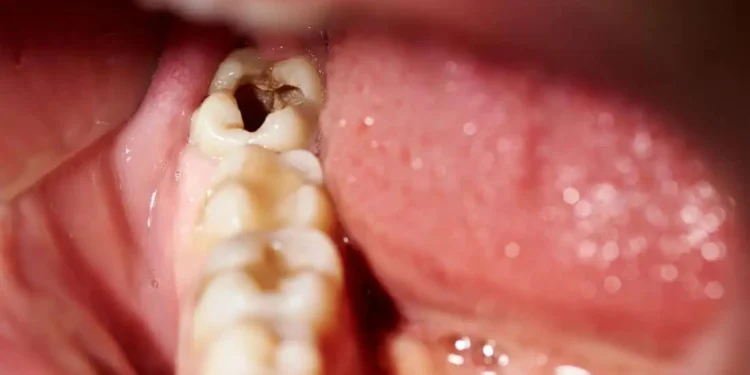Getting your wisdom teeth removed may not be the most exciting prospect, but it’s often a necessary step towards maintaining a healthy mouth. While indulging in a temporary diet of soft foods like macaroni & cheese and chocolate pudding might sound appealing, there can be challenges in the recovery process. One common issue is food getting stuck in the empty wisdom teeth sockets. In this article, we’ll explore why wisdom teeth removal is necessary, how to flush wisdom teeth holes, and what to do if it does happen.
Why Wisdom Teeth Removal is Important
Not everyone is required to have their wisdom teeth removed, but for many, it becomes necessary due to a condition called impaction. Impacted wisdom teeth fail to fully emerge from the gums or grow at an odd angle. This can result in a range of dental problems, including pain, swelling, and various complications. If you suspect wisdom teeth issues, consult your dentist for guidance.
Some potential complications that can arise from not having wisdom teeth removed include:
- Overcrowding: Wisdom teeth can push against existing teeth, causing crowding and misalignment.
- Pain and Swelling: Impacted wisdom teeth can lead to pain, tenderness, and swelling around the gums.
- Tooth Decay: It can be challenging to clean and maintain proper oral hygiene around impacted wisdom teeth, increasing the risk of tooth decay.
- Cysts: Cysts can develop around impacted wisdom teeth, potentially leading to more severe problems.
- Gum Disease: Wisdom teeth can be hard to reach and clean, increasing the risk of gum disease.
Preventing Food from Getting Stuck
During the recovery time following wisdom teeth removal, it’s essential to take measures to prevent food from getting stuck in the extraction sites. Here are some helpful tips:
- Stick to Soft Foods: Choose soft foods like mashed potatoes, macaroni, soup, scrambled or hard-boiled eggs, yogurt, and pudding. These foods are less likely to get lodged in the sockets.
- Avoid Chewing Near the Sockets: Be cautious not to chew near the extraction sites until they have sufficiently healed.
- Rinse with Warm Salt Water: After eating, gently rinse your mouth with warm salt water. This can help dislodge any food particles and promote healing.
- Avoid Problematic Foods: Avoid foods prone to getting stuck, such as rice and anything that is particularly chewy or crunchy.
How To Flush Wisdom Teeth Holes
Keeping the extraction sockets clean is crucial for the healing process. Food particles stuck in these sockets can lead to inflammation, so it’s essential to remove them without disturbing the clot that forms. Here’s how to clean wisdom teeth sockets:
- Gently Rinse with Salt Water: Use a warm saltwater (saline) solution to gently rinse your mouth. Avoid vigorous swishing and refrain from spitting, as this can lead to painful dry sockets.
- Use a Syringe (if provided): If your clinician has given you a syringe, you can use hot water or salt water to gently flush the socket clean. Be careful not to touch the gums with the syringe.
- Consider Germicidal Oral Rinse: Your dentist or oral surgeon may prescribe a germicidal oral rinse to reduce the number of bacteria in your mouth. Follow their recommendations for use.
- Practice Good Oral Hygiene: Since you have an open wound in your mouth, maintaining excellent oral hygiene is crucial. Wash your hands thoroughly before eating, and ensure that anything you put into your mouth is clean.
By following these care recommendations from your clinician, you can typically expect to recover from a wisdom teeth procedure within 3-7 days.
Additional Post-Extraction Tips
Apart from cleaning and preventing food from getting stuck, here are some other tips for a smoother recovery after wisdom teeth removal:
- Avoid Suction: Using straws, smoking, spitting, or aggressively swishing liquids around in your mouth can lead to dry sockets, so it’s best to avoid these activities.
- Stay Hydrated: Drink plenty of liquids to stay hydrated during your recovery.
- Use Ice Packs: Apply ice packs to your cheeks to help reduce swelling.
- Avoid Touching the Surgical Site: Avoid touching the surgical site to prevent infection and complications.
Final Words: How To Flush Wisdom Teeth Holes
Removing your wisdom teeth may be a temporary inconvenience, but it’s essential for maintaining oral health. Following these guidelines on how to prevent food from getting stuck in your wisdom teeth sockets and keeping them clean will help ensure a smoother recovery process. Remember to consult your doctor or oral surgeon for personalized advice and care instructions tailored to your situation.




